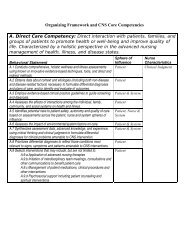Physician
Medicare Physician Guide - National Association of Clinical Nurse ...
Medicare Physician Guide - National Association of Clinical Nurse ...
- No tags were found...
Create successful ePaper yourself
Turn your PDF publications into a flip-book with our unique Google optimized e-Paper software.
DEDUCTIBLES, COINSURANCE, AND COPAYMENTS<br />
Providers and suppliers must collect unmet deductibles, coinsurance, and copayments<br />
from the beneficiary. The deductible is the amount a beneficiary must pay before<br />
Medicare begins to pay for covered services and supplies. These amounts can change<br />
every year. Under the Original Medicare Plan or a Private Fee-for-Service Plan,<br />
coinsurance is a percentage of covered charges that the Medicare beneficiary may pay<br />
after he or she has met the applicable deductible. Providers and suppliers should<br />
determine whether the beneficiary has supplemental insurance that will pay for<br />
deductibles and coinsurance before billing the beneficiary for them. In some Medicare<br />
health plans, a copayment is the amount that is paid by the beneficiary for each medical<br />
service. If a beneficiary is unable to pay these charges, he or she should sign a waiver<br />
that explains the financial hardship. If a waiver is not assigned, the beneficiary’s medical<br />
record should reflect normal and reasonable attempts to collect the charges before they<br />
are written off. The same attempts to collect charges must be applied to both Medicare<br />
beneficiaries and non-Medicare beneficiaries. Consistently waiving deductibles,<br />
coinsurance, and copayments may be interpreted as program abuse.<br />
On assigned claims, the beneficiary is responsible for:<br />
Unmet deductibles;<br />
Applicable coinsurance and copayments; and<br />
Charges for services and supplies that are not covered by Medicare.<br />
COORDINATION OF BENEFITS<br />
Coordination of Benefits (COB) is the process that determines the respective<br />
responsibilities of two or more payers that have some financial responsibility for a<br />
medical claim.<br />
Medicare Secondary Payer Program<br />
Medicare law requires that providers and suppliers determine whether Medicare is the<br />
primary or secondary payer prior to submitting a claim by asking beneficiaries or their<br />
representatives about other health insurance or coverage. In addition, primary payers<br />
must be identified on claims submitted to Medicare. Providers and suppliers should not<br />
rely on Common Working File (CWF) information alone since Medicare Secondary<br />
Payer (MSP) circumstances can change quickly. The following secondary payer<br />
information can be found via the MSP Auxiliary File in the CWF:<br />
MSP effective date;<br />
MSP termination date;<br />
Patient relationship;<br />
Subscriber name;<br />
Subscriber policy number;<br />
Insurer type;<br />
Medicare <strong>Physician</strong> Guide: A Resource for Residents, Practicing <strong>Physician</strong>s and Other Health Care Professionals 33





